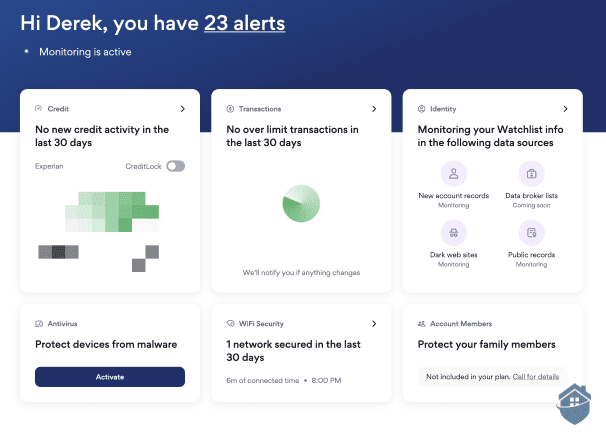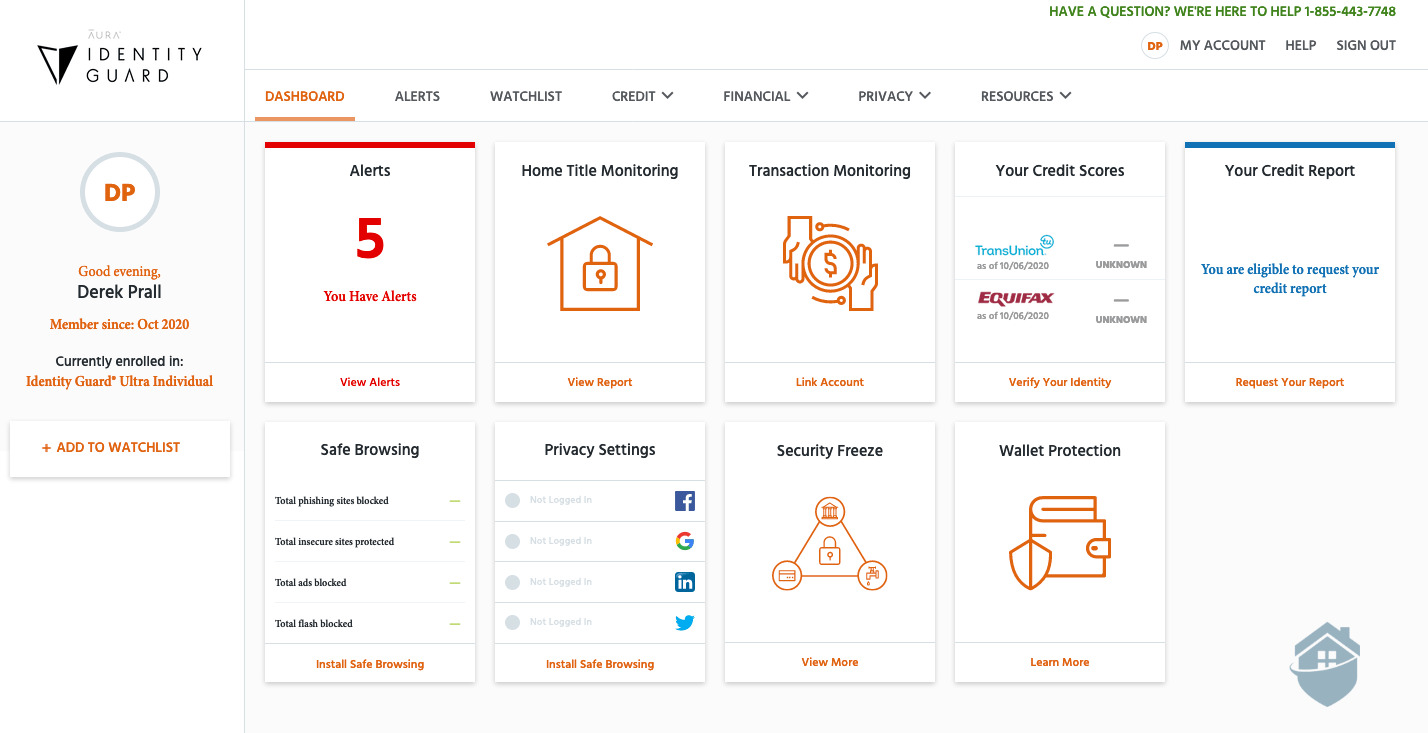Aura and Identity Guard are among the best identity theft protection services in 2025. They come with all of the essential features you need to protect your identity and financial data. And they also provide access to additional tools you don’t get with other services.
While both services are great, we think Aura comes out on top. We really like how all of its subscriptions provide access to the same features. What’s more, Aura also comes with additional features for protecting your online data, securing your devices, and keeping your kids safe online.
For the full picture, we recommend reading the rest of this guide. We go over Aura and Identity Guard’s pricing models and features, and show you what sets these services apart from each other.
Aura & Identity Guard Prices
Before figuring out which one is right for you, let’s make sure they can fit in your budget. We’ll go over Aura and Identity Guard’s subscription tiers, prices, and refund policies.
Aura

Aura Dashboard
Aura has a plan for every member of the family. You can choose something just for the kids or a package that protects just you, you and your significant other, or everyone under your roof. The included features are tailored to the individuals on the plan. Here’s what each Aura plan costs:
| Aura Subscription | Monthly Cost | Annual Cost |
|---|---|---|
| Kids | $13/month | $120/year ($10/month) |
| Individual | $15/month | $144/year ($12/month) |
| Couple | $29/month | $264/year ($22/month) |
| Family | $50/month | $384/year ($32/month) |
The Kids subscription only provides access to parental controls and child safety tools for video games. The Individual, Couple, and Family subscriptions all have the same identity theft protection and credit monitoring features. The only difference is how many adults they cover — the Individual plan is for one adult, the Couple plan for two adults, and the Family plan for five adults and unlimited kids.
We also need to mention that all of Aura’s subscription prices renew at a different rate after one year (subject to the prevailing rate at the time). We noticed that the renewal prices become noticeably steeper if you pay monthly, so we strongly recommend getting an annual plan for the best savings.
You can try any Aura plan free for 14 days, and there is a 60-day money-back guarantee when you pay annually.
>> Check Out: Aura Identity Theft Protection Plans and Pricing
Identity Guard

Identity Guard Dashboard
Identity Guard has three subscription tiers, and it also offers an Individual or a Family plan. The individual plan covers one adult, and the Family plan covers up to five adults and an unlimited number of kids. Here’s a quick overview of Identity Guard’s subscription costs:
| Identity Guard Subscription | Monthly Cost | Annual Cost |
|---|---|---|
| Value |
|
|
| Total |
|
|
| Ultra |
|
|
The most significant differences among Identity Guard’s plans are the included features. The Value tier provides basic protection, but it includes $1 million in identity theft insurance. You’ll also get data breach notifications, dark web monitoring, and high-risk transaction monitoring. But that’s about it.
The Total package adds three-bureau credit monitoring and updates you on your monthly credit score. The Ultra tier offers more extensive protection, with monitoring for your credit and debit cards, 401(k), investments, and home title. You can also lock your credit card if any suspicious activity occurs.
Identity Guard doesn’t come with a free trial like Aura has. But it still provides a 60-day money-back guarantee when you pay for a year up front.
Aura & Identity Guard Feature Comparison
Aura and Identity Guard have similar features when it comes to identity and credit protection. We’ll go over what essential tools you get with each service, and what the main difference between the two is.
Identity Protection
Both Aura and Identity Guard provide very good identity theft protection. Here’s a quick look at what kind of features you get with each service:
| Identity Theft Feature | Aura | Identity Guard |
|---|---|---|
| Identity Theft Insurance | Yes (up to $1 million per user) | Yes (up to $1 million per user) |
| Identity Restoration | Yes | Yes (only via Ultra plan) |
| Dark Web Monitoring | Yes | Yes |
| Breach Notifications | Yes | Yes |
| Personal Information & SSN Monitoring | Yes | Yes |
| Home Title Monitoring | Yes | Yes (only via Ultra plan) |
| Criminal Records Monitoring | Yes | Yes (only via Ultra plan) |
There is one noticeable difference, though. All of Aura’s subscriptions come with the same identity theft protection features. On the other hand, Identity Guard includes the bulk of its features in its Ultra subscription. Its Value and Total subscription are missing certain features, such as home title monitoring, identity restoration, and criminal records monitoring. That makes Aura more convenient, but Identity Guard would still be a good pick if you’re on a budget and only want basic identity theft protection.
Credit Monitoring
Both services come with great credit monitoring and protection features. Here’s a quick overview of what you get with both Aura and Identity Guard:
| Credit Monitoring Feature | Aura | Identity Guard |
|---|---|---|
| Transaction Monitoring | Yes | Yes |
| Bank Account Monitoring | Yes | Yes (only via Total and Ultra plans) |
| 3-Bureau Credit Monitoring | Yes | Yes (only via Total and Ultra plans) |
| Monthly Credit Score | Yes | Yes (only via Total and Ultra plans) |
| 401(k) & Investment Account Monitoring | Yes | Yes (only via Total and Ultra plans) |
| Experian Credit Lock | Yes | Yes (only via Ultra plan) |
Aura once again provides more convenience, as it provides access to all credit monitoring features via all subscriptions. Identity Guard only provides basic transaction monitoring via all subscriptions — the rest of its features are only available via its Total and Ultra subscriptions.
Additional Security Features
In addition to identity theft protection and credit monitoring, Identity Guard also offers a few extra security services. This includes a password manager and Safe Browsing. The password manager lets you secure and generate strong logins, and Safe Browsing is a browser extension that provides protection against phishing websites, ads, and ad trackers.
However, Aura also includes those security features. And on top of them, it has additional services:
- Virtual Private Network (VPN). A VPN hides your IP address and encrypts your internet traffic to make it unreadable. VPNs also allow you to access sites that are not available in your location.
FYI: We tested the VPN when we reviewed Aura, and the service performed very well. It maintained very fast speeds, it passed all of our leak tests, and it worked very well with popular streaming sites.
- Antivirus. This is a security app that protects your device from malware infections. It also prevents you from accessing malicious sites and links.
- Data removal. Aura requests the removal of your personal data from data brokers, which collect and sell it to advertisers.
- Email Alias. Generates fake emails when you sign up on certain websites, which protects you from potential data breaches and spam.
- Spam call and message protection. Aura uses AI to protect you from phone scams. This feature is included with the Family subscription, and available as a paid add-on on the other subscriptions.
Child Protection
We believe Aura is a better way to prevent your kids from becoming a part of any child identity theft statistics. Identity Guard provides online account and SSN monitoring for kids, but that’s about it.
Aura’s Family subscription provides all of the above, and it also offers credit freeze support if you need to protect your kids’ credit files. Plus, Aura also sends you alerts about known and new sex offenders within a one mile radius of your address.
What’s more, Aura’s Family subscription comes with parental controls. This lets you filter inappropriate content and sites, view reports about your child’s online history and device usage, pause internet access, and set and schedule screen time limits.
FYI: Some families draw up agreements with their children for the amount of time they can be on devices, the time of day they can go online, and what type of activities they can do on the internet. We dive into it further in our article on keeping kids safe in the digital age.
We also like how Aura helps you keep your kids safe from predators and cyberbullying when playing video games. The service does this via 24/7 in-game voice and text monitoring (and this feature also covers 200+ popular PC games).
Comparing Aura & Identity Guard’s Privacy Policies
Clicking on the Identity Guard privacy policy takes you to the Aura privacy policy page, which is helpful when comparing the two products. It can also be confusing, though, since there is no reference to Identity Guard within it. Aura being the parent company of Identity Guard is the missing context.
Fortunately, there is nothing else that can be misunderstood within the document. It is easy to jump to sections about the information they collect, how they use your personal information, and who they share it with and why.
The only line that rang an alarm bell for us was, “We may provide your personal data to partners to confirm your eligibility for joint or co-branded offers or to communicate and administer such offers (e.g. verify eligibility, assess effectiveness of joint offer, etc.).”
Did You Know? One of Aura’s features is the ability to request your personal info be removed from data brokers — companies that sell your information to advertisers and telemarketers.
It goes on to say partners can only use the data Aura provides to communicate, evaluate, improve, and administer the offer.
Since other partners, such as Circle and Kidas, power some of Aura’s services, you should also note that your information will be shared with them. If that concerns you, Aura and Identity Guard may not be the best solution for you. We were OK with it, since we would sign up for any of the partner services on their own.
Verdict: Aura or Identity Guard?
Identity Guard provides very strong identity theft protection and credit monitoring, but its offerings don’t stack up compared to Aura.
Advanced features such as credit lock, three-bureau credit monitoring, and 401(k) monitoring are available with all Aura subscriptions, whereas they are included only in Identity Guard’s more expensive subscription tiers. You also miss out on online protection tools such as a VPN and antivirus, as well as parental control features.
The addition of a 14-day free trial also means you can try any Aura plan before you commit. With annual plans, that 14-day free trial turns into a 60-day money-back guarantee, so you can fully experience the product to ensure it’s right for you.
For all those reasons, we recommend choosing Aura over Identity Guard for your identity theft protection needs.
FAQs
- Is Identity Guard owned by Aura?
Aura is Identity Guard’s parent company. The business is headquartered in Boston. It also owns Hotspot Shield, FigLeaf, PrivacyMate, and Intrusta.
- Does Aura monitor bank accounts?
Aura alerts you when unusual activity occurs on your bank account. It even has a lost wallet service, so you can easily cancel cards and organize replacements.
- Does Identity Guard have a VPN?
You get access to a password manager and safe browsing tool with Identity Guard, but it does not offer a VPN with any of its plans.
- Does Aura sell my data?
Aura shares information with partners to power some of its features, but the company clearly states that it does not sell your data.
- Can Identity Guard lock your credit?
Identity Guard’s Ultra plan lets you lock your credit file with Experian. That will stop anyone from opening unauthorized accounts or taking out loans in your name.






